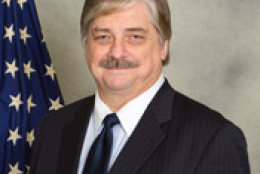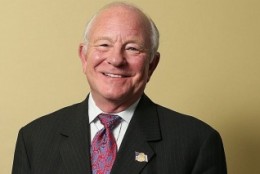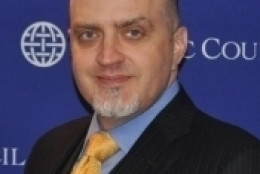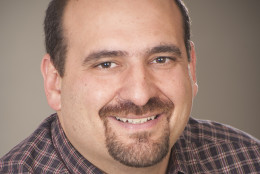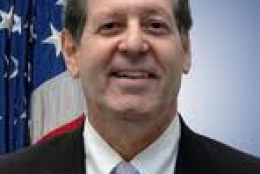Digital Government
-
OPM's recent cybersecurity breach shows how tight budgets, limited expertise and cultural blind spots create perfect storms of agency vulnerability throughout the federal environment.
July 20, 2015 Tighter collaboration between the Pentagon and Silicon Valley is one of Defense Secretary Ash Carter's top priorities as he tries to push the department to become more innovative and agile. He wants DoD to broaden its horizons and adopt some of the best practices the tech industry is using to become more innovative. That was the message he brought to the Sun Valley Conference in Idaho last week. Larry Allen is president of Allen Federal Business Partners and also writes the Week Ahead newsletter. He tells In Depth guest host Jared Serbu that federal IT won't look anything like the innovations coming out of Silicon Valley.
July 16, 2015-
It's been four and a half years since the White House proclaimed it wanted agencies to make a big move to cloud computing via the so-called "cloud first" policy. But the pace of cloud adoption has been far slower than what former federal CIO Vivek Kundra probably had in mind back in 2010. The American Council of Technology-Industry Advisory Council set out to find out why -- and then, in a new guidebook, explain how agencies can break down perceived barriers to cloud adoption. Mark Day is the co-chair of the ACT-IAC Cloud Computing Working Group and also the deputy assistant commissioner in GSA's integrated technology service. He tells In Depth guest host Jared Serbu what's in the new guidebook and how it will help agencies move to the cloud.
July 16, 2015 -
The number of agency employees using two-factor authentication is 20 percent since the start of the 30-day cybersecurity sprint. Federal Chief Information Officer Tony Scott had some positive results to share at the halfway point. Patrick Flynn is the director of homeland and national security programs at Intel Security, and former assistant chief of the Office of Border Patrol at Customs and Border Protection. He tells In Depth with Francis Rose what we should be looking for as more agencies report their progress at the end of the cyber sprint.
July 15, 2015 -
The OPM cyber attack may turn out to have a silver lining. The attack may give agencies an opportunity — if they choose to take it — to redefine encryption. Chuck Archer is the executive chairman at Covata and former assistant director of the Federal Bureau of Investigation. He tells In Depth with Francis Rose that encryption isn't a people problem.
July 15, 2015 -
Dave Wennergren, senior vice president, Technology Policy, at the Professional Services Council and Dave Chesebrough, president of the Association for Enterprise Information, join host John Gilroy to talk about the Federal Information Technology Acquisition Reform Act. July 14, 2015
July 13, 2015 -
If you're connected to the Internet, you have an IP address. And while the net itself may seem infinite, IP addresses are not. In fact, IP version 4 addresses are supposed to run out. Internet Service Providers are upgrading to IPv6. At least, that's the plan. Jim Cowie is the Chief Scientist at Dyn, an Internet performance company. On the Federal Drive, he told Tom Temin why brokering IPv4 addresses is still a booming business.
July 13, 2015 -
The cyber domain is often referred to as a new frontier in global conflict -- one that nations are still learning to fight in. But one expert says there are actually plenty of historical examples of conflict in cyberspace -- and that leaders need to study them if they want to understand what it means to win or lose in that domain. Jay Healey is a nonresident senior fellow at the Atlantic Council and senior research scholar at Columbia University. He tells In Depth guest host Jared Serbu what it means to win in a cyber war.
July 10, 2015 The rise of the chief data officer across government comes from new opportunities and holes in the federal technology space. Chief information officers spend a majority of their time on infrastructure issues. And chief technology officers focus on the next IT innovation agencies can take advantage of. DJ Patil is the White House’s chief data scientist. In part two of his special report, Deconstructing the CDO, Patil tells Federal News Radio Executive Editor Jason Miller how chief data officers are filling in the gap between CIOs and CTOs.
July 08, 2015-
DJ Patil, the government's first-ever chief data scientist, explains his mission using a simple phrase: "responsibly unleash the power of data for the benefit of the American public.” In part 2 of Federal News Radio’s special report, Deconstructing the CDO, Patil tells Federal News Radio how his office is helping agency CDOs bring a ruthless focus to data.
July 08, 2015 -
The buzz around big data is growing in volumes. Eight agencies, including the Energy, Commerce and Transportation departments have each named a formal chief data officer. But agencies must find the right balance of roles between these hip CDOs and the tried-and-true chief information officers as federal IT evolves through cloud and the commoditization of technology. In part 1 of his special report, Deconstructing the CDO, Federal News Radio Executive Editor Jason Miller explores the growing complexity between data and information.
July 07, 2015 -
Katherine Archuleta's recent time in the congressional hot seat is a wake-up call for all agency executives. Chief information officers that oversee cyber at their agencies are scrambling to meet the 30-day cyber sprint imposed by Federal Chief Technology Officer Tony Scott. Steve Cooper is the chief information officer at the Commerce Department. He tells Federal News Radio Executive Editor Jason Miller why now is the opportunity for the entire agency to look at the way it does cyber.
July 07, 2015 -
As more and more agencies hire chief data officers, the question arises, what’s the difference between data and information? And where does the chief information officer fit into the discussion? In the first part of our special report, Deconstructing the CDO, federal CIOs and CDOs agree there is room for both as agencies mature their use and understanding of data.
July 07, 2015 -
The Office of Personnel Management's Electronic Questionnaires for Investigations Processing system is offline now after the agency says it found a security vulnerability. The site will be offline for four to six weeks. OPM hasn't said the discovery came out of the 30-day cyber sprint called for by federal CIO Tony Scott. Karen Evans, executive director of the U.S. Cyber Challenge and former e-gov administrator at the Office of Management and Budget, is watching the agencies respond to Tony Scott's call. She tells In Depth with Francis Rose, how the OPM breach is changing the way agencies protect their data.
June 30, 2015 -
As the deputy associate administrator in the General Services Administration’s Office of Citizen Services and Innovative Technologies, Conrad oversaw the development of key initiatives including the cloud security standard and Data.gov.
June 30, 2015


